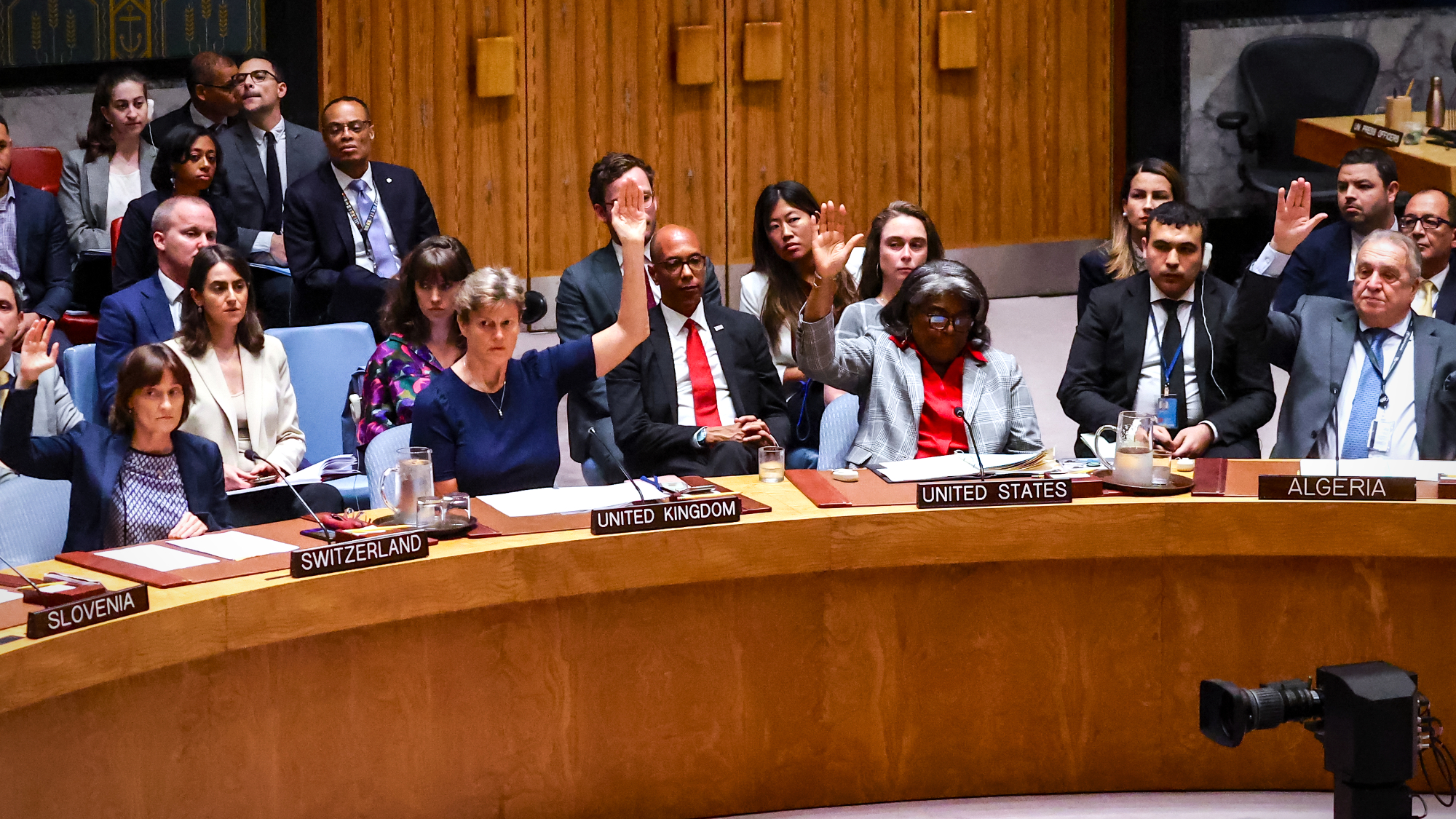UN vote ups pressure on Israel, Hamas for Gaza deal
The United Nations Security Council voted to endorse a U.S.-backed cease-fire deal for Gaza


A free daily email with the biggest news stories of the day – and the best features from TheWeek.com
You are now subscribed
Your newsletter sign-up was successful
What happened
The United Nations Security Council voted 14-0 on Monday to endorse a U.S.-backed cease-fire deal for Gaza, increasing pressure on Israel and Hamas to bring an end to the conflict. Russia abstained. The three-stage plan, approved by Israel's war cabinet, was unveiled 10 days ago by President Joe Biden.
Who said what
The Security Council vote "sent a clear message to Hamas to accept the cease-fire deal on the table," said U.S. Ambassador to the U.N. Linda Thomas-Greenfield. Israel has already approved the plan, and "the fighting could stop today if Hamas would do the same."
But Israel's U.N. representative "did not say that Israel has accepted the terms of the cease-fire plan," and while Hamas welcomed the resolution and indicated it would "engage in indirect negotiations" to implement the deal, it also "did not endorse the plan as a whole," The New York Times said. The "central sticking point," The Washington Post said, is that Hamas wants a "permanent cease-fire" while Israel is vowing to "continue fighting to achieve total military victory, a goal U.S. officials say is unattainable."
What next?
The "unusual show of relative unity by a deeply divided Security Council" puts pressure on Israel and Hamas to reach an agreement, said The Guardian. But both sides have so far shown themselves "far more influenced by local constituencies and the personal interests of leaders" than by "international public opinion."
The Week
Escape your echo chamber. Get the facts behind the news, plus analysis from multiple perspectives.

Sign up for The Week's Free Newsletters
From our morning news briefing to a weekly Good News Newsletter, get the best of The Week delivered directly to your inbox.
From our morning news briefing to a weekly Good News Newsletter, get the best of The Week delivered directly to your inbox.
A free daily email with the biggest news stories of the day – and the best features from TheWeek.com
Peter has worked as a news and culture writer and editor at The Week since the site's launch in 2008. He covers politics, world affairs, religion and cultural currents. His journalism career began as a copy editor at a financial newswire and has included editorial positions at The New York Times Magazine, Facts on File, and Oregon State University.
-
 Magazine solutions - February 27, 2026
Magazine solutions - February 27, 2026Puzzle and Quizzes Magazine solutions - February 27, 2026
-
 Magazine printables - February 27, 2026
Magazine printables - February 27, 2026Puzzle and Quizzes Magazine printables - February 27, 2026
-
 ‘The forces he united still shape the Democratic Party’
‘The forces he united still shape the Democratic Party’Instant Opinion Opinion, comment and editorials of the day
-
 Trump links funding to name on Penn Station
Trump links funding to name on Penn StationSpeed Read Trump “can restart the funding with a snap of his fingers,” a Schumer insider said
-
 Trump reclassifies 50,000 federal jobs to ease firings
Trump reclassifies 50,000 federal jobs to ease firingsSpeed Read The rule strips longstanding job protections from federal workers
-
 Supreme Court upholds California gerrymander
Supreme Court upholds California gerrymanderSpeed Read The emergency docket order had no dissents from the court
-
 700 ICE agents exit Twin Cities amid legal chaos
700 ICE agents exit Twin Cities amid legal chaosSpeed Read More than 2,000 agents remain in the region
-
 Is the Gaza peace plan destined to fail?
Is the Gaza peace plan destined to fail?Today’s Big Question Since the ceasefire agreement in October, the situation in Gaza is still ‘precarious’, with the path to peace facing ‘many obstacles’
-
 Trump demands $1B from Harvard, deepening feud
Trump demands $1B from Harvard, deepening feudSpeed Read Trump has continually gone after the university during his second term
-
 House ends brief shutdown, tees up ICE showdown
House ends brief shutdown, tees up ICE showdownSpeed Read Numerous Democrats joined most Republicans in voting yes
-
 Trump’s Kennedy Center closure plan draws ire
Trump’s Kennedy Center closure plan draws ireSpeed Read Trump said he will close the center for two years for ‘renovations’
